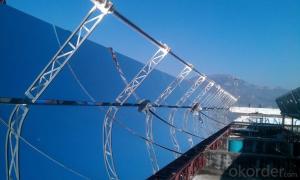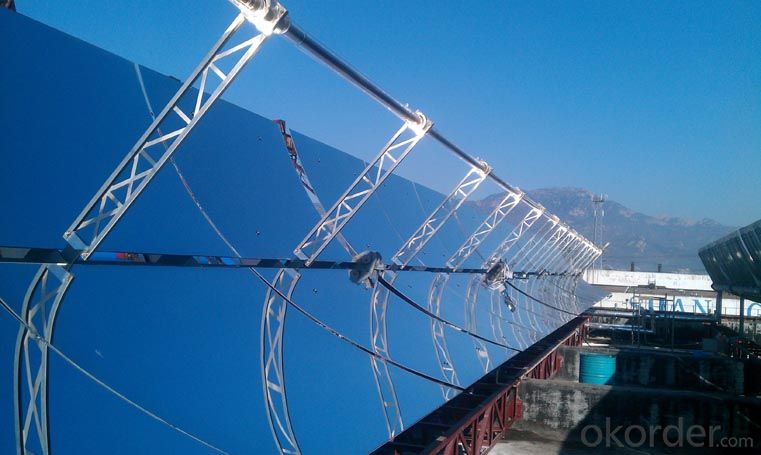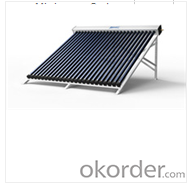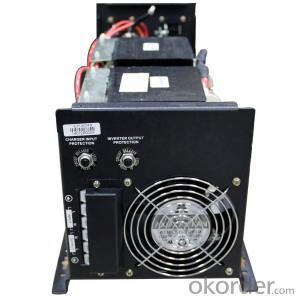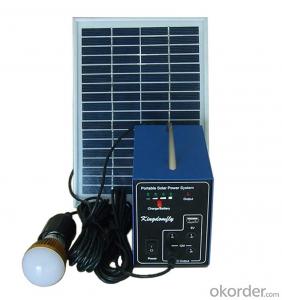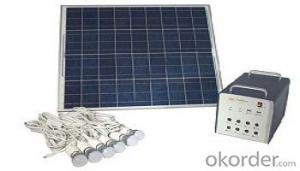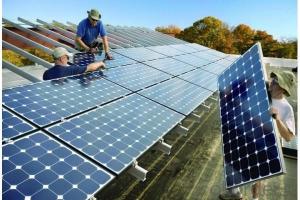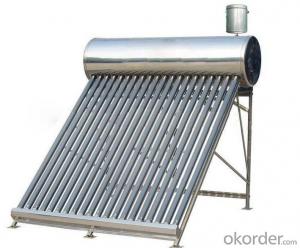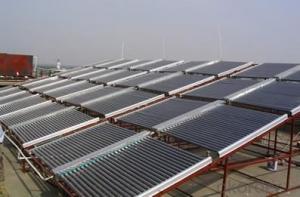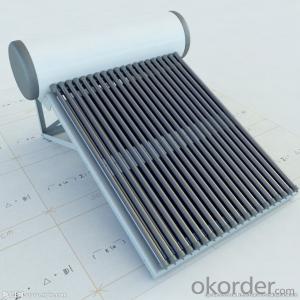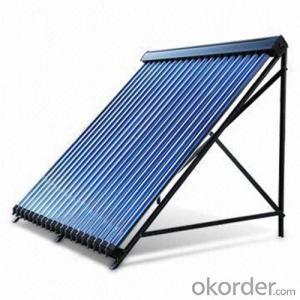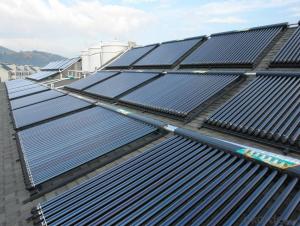Solar Energy Systems Woodbury - Pressurized Solar Collector with Heat Pump
- Loading Port:
- Shanghai
- Payment Terms:
- TT or LC
- Min Order Qty:
- 100 m²
- Supply Capability:
- 100000 m²/month
OKorder Service Pledge
OKorder Financial Service
You Might Also Like
Descritpion:
CNBM Solar is a world-leading and Vertical integrated manufacturer of high-performance with Silicon,
Wafer, Cells, Modules, which convert sunlight into electricity for residential, commercial, and utility-scale
power generation.
The capacity of CNBMSolar is reach to 1GW, and make sure each year our shipment capacity is more
Than 700-800MWs, at the same time, we have set up the largest solar power station with our partner
in Ukraine.
CNBM is a Quality + Service oriented company with“Excellence at Each Step” approach, composed of
the finest components from TUV and IEC-certified partners around the world, CNBM modules consistently
undergo a variety of trials at the company’s Test & Development Centre, ensuring peak performance
capabilities. The company is committed to develop and provide the world with clean and renewable energy
to ease the energy shortages as well as human kind’s impact on the environment.
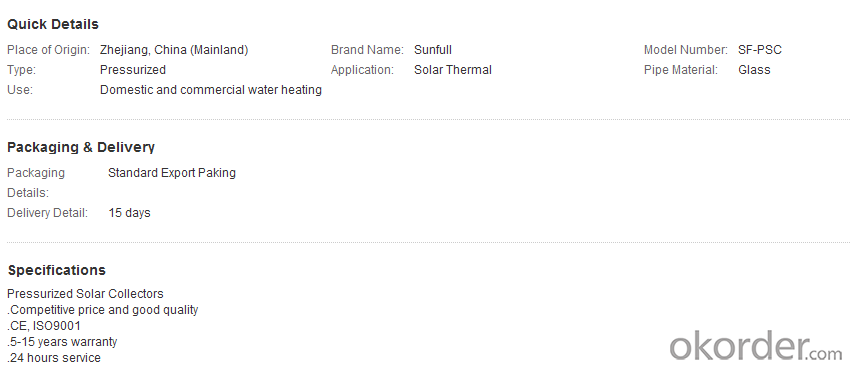
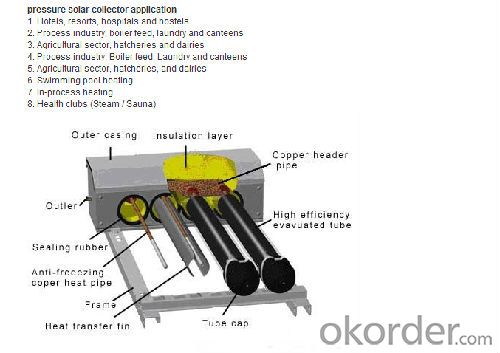
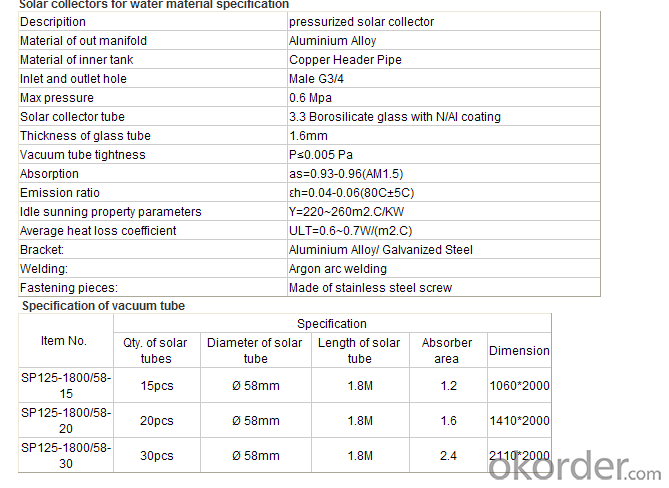
FAQ:What's CNBM's strength?
CNBM Group is short for China National Building Materials Group Corporation, which is established in 1984 with approval from the State Council. It is a China state owned company ,one of Global Fortune 500 .SO,CNBM can get more support from government .
- Q: How do solar energy systems impact energy access in developing countries?
- Solar energy systems have a significant positive impact on energy access in developing countries. These systems provide a clean and sustainable source of electricity that is often more affordable and reliable than traditional fossil fuel-based options. By harnessing the abundant sunlight, solar power enables communities to gain access to electricity in remote areas where grid infrastructure is limited. This improves the quality of life by powering homes, schools, and healthcare facilities, while also stimulating economic growth and reducing carbon emissions. Overall, solar energy systems play a crucial role in expanding energy access and promoting sustainable development in developing countries.
- Q: Can solar energy systems be used in areas with limited access to social services?
- Yes, solar energy systems can be used in areas with limited access to social services. Solar energy systems are a decentralized and standalone source of electricity, which means they can be installed and operated independently. This makes them suitable for remote or underdeveloped areas where access to social services, including reliable electricity, may be limited. Solar energy systems can provide a sustainable and affordable solution for generating electricity, powering essential services such as lighting, water pumps, and communication devices, thereby improving the quality of life in these areas.
- Q: Can solar energy systems be used for industrial process heat?
- Yes, solar energy systems can be used for industrial process heat. Solar thermal systems, such as solar water heaters or concentrated solar power systems, can effectively capture and convert sunlight into heat energy, which can be used for various industrial processes such as drying, sterilization, or heating fluids. These systems are sustainable and offer an environmentally friendly alternative to traditional fossil fuel-based heating methods, reducing greenhouse gas emissions and energy costs for industrial operations.
- Q: Can solar energy systems be used in areas with limited financial resources?
- Yes, solar energy systems can be used in areas with limited financial resources. These systems have become increasingly affordable and accessible over the years, with various financing options and government incentives available to support their installation. Additionally, solar energy can help reduce electricity bills in the long run, providing a cost-effective and sustainable energy solution for communities with limited financial resources.
- Q: What is the expected return on investment for a solar energy system?
- The return on investment (ROI) for a solar energy system can vary based on several factors, such as the initial cost, location, available incentives, and energy usage. Typically, solar energy systems are expected to yield a positive ROI over their lifespan. Installing a solar energy system involves a significant upfront investment, including expenses for solar panels, inverters, and installation. However, the decreasing costs of solar technology in recent years have made the initial expense more affordable. The location of the solar energy system is crucial in determining the expected ROI. Areas with higher solar irradiance and longer sunshine hours tend to generate more electricity, resulting in a higher ROI. Additionally, net metering policies that allow excess electricity to be credited back to the owner can further boost the ROI. Government incentives and subsidies can have a significant impact on the expected ROI. Many countries provide tax credits, grants, and rebates to promote the adoption of solar energy systems. These incentives reduce the initial cost and expedite the payback period, thus enhancing the overall ROI. Furthermore, the energy usage of the property plays a critical role in determining the expected ROI. Higher electricity consumption offers more opportunities for the solar energy system to offset utility bills, resulting in greater savings and an improved ROI. While the specific ROI can vary, studies indicate that solar energy systems typically recoup their costs within 5 to 10 years and continue to generate free electricity for several decades. This extensive period of energy production allows for substantial savings on utility bills and a positive ROI over the system's lifetime. In summary, investing in a solar energy system can provide long-term financial benefits, including reduced electricity costs, potential revenue from excess electricity generation, and increased property value. Conducting a comprehensive evaluation considering the aforementioned factors is crucial in determining the expected ROI for a solar energy system in a specific scenario.
- Q: Can solar energy systems be used in powering airports or transportation hubs?
- Yes, solar energy systems can be used to power airports or transportation hubs. In fact, many airports around the world are already using solar energy to offset their energy consumption and reduce their carbon footprint. Solar panels can be installed on rooftops, parking lots, or unused land at airports to generate electricity that can be used to power various operations, such as lighting, heating, cooling, and even charging electric vehicles. This helps airports become more sustainable and reduce their dependence on fossil fuels.
- Q: How does the cost of solar energy compare to other energy sources?
- Over the past few years, solar energy has become increasingly cost competitive with other forms of energy. In the beginning, solar panels were more expensive due to high installation costs and limited efficiency compared to fossil fuels. However, advancements in technology, economies of scale, and supportive government policies have significantly reduced the cost of solar energy. Currently, solar energy is rapidly becoming more affordable and competitive. In many areas, it is already cheaper than coal and natural gas, which used to be the most cost-effective energy sources. This trend is expected to continue as solar technology improves and becomes more efficient. One of the main reasons for the decrease in solar energy costs is the falling prices of solar panels. Over time, the prices of photovoltaic (PV) modules, the key component of solar panels, have significantly dropped. Additionally, the manufacturing process has become more streamlined and efficient, resulting in cost savings. Moreover, the operational costs of solar energy are relatively low because sunlight, the primary fuel source, is abundant and free. Compared to fossil fuel-based power plants, solar energy systems require less maintenance and have a longer lifespan, leading to lower operating costs in the long run. Government incentives and policies have also played a crucial role in reducing the cost of solar energy. Many countries and regions offer financial incentives, tax credits, grants, and subsidies to encourage the use of solar energy. These initiatives make solar installations more affordable for consumers and incentivize investment in solar technology, driving economies of scale and further reducing costs. In conclusion, the cost of solar energy has become highly competitive with other energy sources due to technological advancements, economies of scale, and supportive government policies. As solar energy becomes more affordable, it is expected to play a significant role in the global energy transition, offering a clean, sustainable, and cost-effective alternative to traditional energy sources.
- Q: Can solar panels be installed on mobile homes or trailers?
- Yes, solar panels can be installed on mobile homes or trailers. In fact, many people choose to install solar panels on their mobile homes or trailers to harness clean and renewable energy, reduce their carbon footprint, and save on electricity bills.
- Q: Can solar energy systems power an entire home or business?
- Yes, solar energy systems have the potential to power an entire home or business. The size and efficiency of the system, as well as the energy requirements of the property, play a crucial role in determining if it can meet all the energy needs. With the right design and installation, solar energy systems can provide enough electricity for the entire building, while also reducing reliance on traditional energy sources and lowering carbon emissions.
- Q: What is the lifespan of solar panels?
- The average lifespan of solar panels is around 25 to 30 years, although many panels can continue to produce electricity for even longer with proper maintenance and care.
Send your message to us
Solar Energy Systems Woodbury - Pressurized Solar Collector with Heat Pump
- Loading Port:
- Shanghai
- Payment Terms:
- TT or LC
- Min Order Qty:
- 100 m²
- Supply Capability:
- 100000 m²/month
OKorder Service Pledge
OKorder Financial Service
Similar products
Hot products
Hot Searches
Related keywords
